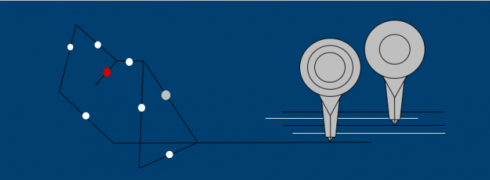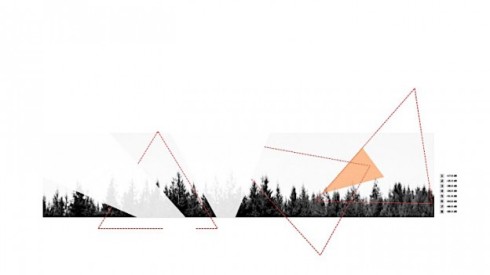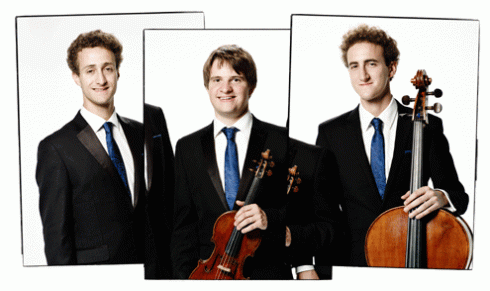Conceived during coronavirus lockdown, MultiTraction Orchestra is the latest brainchild of cross-disciplinary Sefiroth/Blue-Eyed Hawk guitarist Alex Roth (currently pursuing new avenues and familial roots in Kraków). It’s his way of fighting the entropy, fear and disassociation of the times: part-corralling/part-embracing a cluster of diverse yet sympathetic musicians, recruited via friendship and open-source callups on the web. ‘Emerge Entangled’ is the first result: twenty-seven players working from Alex’s initial two-and-a-half minute pass of treated, multi-layered minimalist guitarwork. If the video accompaniment (a graceful come-and-go conference call featuring most of the players) is anything to go by, Alex played the part of benign/mostly absent god for this recording. There are no solos, no aggressive chord comping. In the few shots in which they feature, his guitars and pedals sit by themselves in a system loop creating the drone with no further intervention. Instead, Alex acts as the invisible mind on faders, reshuffling the instrumental echoes and response which came back from his loop broadcast.
It’s an eight-city affair; although the majority of musicians hail from Alex’s other base, London (including his percussionist brother and Sefiroth bandmate Simon, trombonists Kieran Stickle McLeod and Raphael Clarkson, Rosanna Ter-Berg on flute, Madwort reedsman Tom Ward on clarinet, drummer Jon Scott and effects-laden double bassist Dave Manington), the MultiTraction net spreads wide. Finnish cellist Teemu Mastovaara, from Turku, is probably the most northerly contributor; Mexico City saxophonist Asaph Sánchez the most southerly; and Texas-based glockenspieler and touch guitarist Cedric Theys the most westerly. (Muscovian tuba player Paul Tkachenko and Lebanon-based iPad manipulator Stephanie Merchak can battle out as to who’s holding it down for the east).Instrumentally, although there’s a definite slanting towards deep strings, brass and rolling-cloud drones, there’s plenty of variety: from the vintage Baroque flute of Gdańsk’s Maja Miró to the Juno 6 colourings of London soundtracker Jon Opstad and the homemade Coptic lute of Exeter-based Ian Summers. Alex’s other brother, saxophonist Nick, features in the Dublin contingent alongside the accordion work of Kenneth Whelan and cello from Mary Barnecutt. Most of the remaining string players are dotted around England (with double bassist Huw V. Williams and James Banner in St Albans and Leeds respectively, and violinist Alex Harker in Huddersfield). There’s a knot of contributory electronica coming out of Birmingham from Andrew Woodhead and John Callaghan (with virtual synthesist Emile Bojesen chipping in from Winchester), and some final London contributions from jazz pianist/singer Joy Ellis and sometime Anna Calvi collaborator Mally Harpaz bringing in harmonium, timpani and xylophone.
Alex’s past and present work includes jazz, experimental noise, soulfully mournful Sephardic folk music and dance theatre; and while his guitar basework for ‘Emerge Entangled’ seems to recall the harmonic stillness and rippling, near-static anticipatory qualities of 1970s German experimental music such as Cluster (as well as Terry Riley or Fripp and Eno), plenty of these other ingredients swim into the final mix. I suspect that the entanglement Alex intends to evoke is quantum rather than snarl-up: a mutuality unhindered by distance. From its blind beginnings (no-one hearing any other musicians apart from Alex) what’s emerged from the experiment is something which sounds pre-composed; or, at the very least, spun from mutual sympathy.
There are definite sections. An overture in which increasingly wild and concerned trombone leads over building, hovering strings and accordion (gradually joined by burgeoning harmonium, filtered-in glockenspiel and percussion, dusk-flickers of bass clarinet, cello and synth) sounds like New Orleans funeral music hijacked by Godspeed! You Black Emperor; the first seepage of flood water through the wall. With a change in beat and emphasis, and the push of drums, the second section breaks free into something more ragged and complicated – a muted metal-fatigue trombone part protesting over synth drone and subterranean tuba growl, which in turn morphs into a double bass line. Various other parts make fleeting appearances (a transverse flute trill, Alex’s guitar loops bumped up against jazz drumkit rolls; a repeating, rising, scalar/microtonal passage on lute, like a Holy Land lament). Throughout, there’s a sense of apprehension, with something ominous lurking outside in the sky and the air and elements; the more melodic or prominent instruments an array of voices trying to make sense of it, their dialects, personalities, arguments and experiences different, but their querulous humanity following a common flow.
Via touches of piano, theme alternations come faster and faster. A third section foregrounds the tuba, moving in and out in deep largo passages while assorted electronics build up a bed of electrostutter underneath. During the latter, watch out in the video for benign eccentronica-cabaret jester John Callaghan, quietly drinking a mugful of tea as his laptop pulses and trembles out a gentle staccato blur. It’s not the most dramatic of contributions, but it feels like a significant one: the mundaneity and transcendent patience which must be accepted as part of lockdown life, an acknowledgement of “this too will pass”. For the fourth section, a tuba line passes seamlessly into a bass clarinet undulation with touches of silver flute; accelerations and rallentandos up and down. Initially some spacier free-jazz flotsam makes its presence felt – electronics and cosmic synth zaps, saxophonic key rattles, buzzes and puffs, fly-ins of cello and double bass. The later part, though, is more of a classical meditation: beatless and with most instruments at rest, predominantly given over to the dark romance of Teemu Mastovaara’s lengthy cello solo (apprehensive, heavy on the vibrato and harmonic string noise, part chamber meditation and part camel call). The finale takes the underlying tensions, squeezes them in one hand and disperses them. An open duet between Jo Ellis’ piano icicles and Asaph Sánchez’s classic tenor ballad saxophone, it becomes a trio with Jo’s glorious, wordless vocal part: hanging in the air somewhere between grief and peace. A moving, thrilling picture of the simultaneously confined and stretched worldspace we’re currently living in, and a small triumph of collaboration against the lockdown odds.
* * * * * * * *
Although ‘Emerge Entangled’ has a number of masterfully responsive drummers and percussionists in place already, it’s a shame that Cheltenham/Xposed Club improv mainstay Stuart Wilding isn’t one of them. His Ghost Mind quartet (three players plus a wide world picture woven in through field recording) have proved themselves to be one of the most interesting listen-and-incorporate bands of recent years. However, he’s continued to be busy with his own lockdown music. ‘Spaces’ and “Horns” are personal solo-duets – possibly single-take, in-situ recordings. Both created in the usual Xposed Club home of Francis Close Hall Chapel, they’re direct and in-the-moment enough that you can hear the click of the stop button. Stuart’s apparently playing piano mostly with one hand while rustling, tapping and upsetting percussion with the other. By the sound of it the main percussion element is probably his lap harp or a zither, being attacked for string noise and resonance.
Assuming that that’s the case, ‘Spaces’ pits grating, dragging stringflutter racket against the broken-up, mostly rhythmic midrange exploration of an unfailingly cheerful piano. Sometimes a struck or skidded note on the percussion prompts a direct echo on the piano. As the former becomes more of a frantic, swarming whirligig of tortured instrumentation (as so frequently with Stuart, recalling the frenetic and cheeky allsorts swirl of Jamie Muir with Derek Bailey and King Crimson), picking out these moments of congruence becomes ever more of a game: while in the latter half, the piano cuts free on whimsical, delighted little leaps of its own. About half the length of ‘Spaces’, ‘Horns’ begins with the percussion apparently chain-sawing the piano in half while the latter embarks on a rollicking one-handed attempt at a hunting tune. The piano wins out. I’m not sure what became of the fox.
MultiTraction Orchestra: ‘Emerge Entangled’
self-released, no catalogue number or barcode
Download/streaming track
Released: 1st May 2020
Get it from: download from Bandcamp, Apple Music or Amazon; stream from Soundcloud, YouTube, Deezer, Google Play, Spotify and Apple Music.
MultiTraction Orchestra/Alex Roth online:












Stuart Wilding: ‘Spaces’ & ‘Horns’
self-released, no catalogue number or barcode
Download/streaming tracks
Released: 5th May 2020
Get it from: Bandcamp – ‘Spaces‘ and ‘Horns‘
Stuart Wilding online:


























